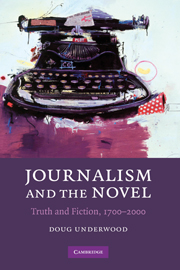Book contents
- Frontmatter
- Contents
- Acknowledgements
- Introduction
- Chapter 1 Journalism and the rise of the novel, 1700–1875: Daniel Defoe to George Eliot
- Chapter 2 Literary realism and the fictions of the industrialized press, 1850–1915: Mark Twain to Theodore Dreiser
- Chapter 3 Reporters as novelists and the making of contemporary journalistic fiction, 1890–today: Rudyard Kipling to Joan Didion
- Chapter 4 The taint of journalistic literature and the stigma of the ink-stained wretch: Joel Chandler Harris to Dorothy Parker and beyond
- Epilogue: The future of journalistic fiction and the legacy of the journalist-literary figures: Henry James to Tom Wolfe
- Appendix: The major journalist-literary figures: their writings and positions in journalism
- Notes
- Index
Chapter 4 - The taint of journalistic literature and the stigma of the ink-stained wretch: Joel Chandler Harris to Dorothy Parker and beyond
Published online by Cambridge University Press: 09 July 2009
- Frontmatter
- Contents
- Acknowledgements
- Introduction
- Chapter 1 Journalism and the rise of the novel, 1700–1875: Daniel Defoe to George Eliot
- Chapter 2 Literary realism and the fictions of the industrialized press, 1850–1915: Mark Twain to Theodore Dreiser
- Chapter 3 Reporters as novelists and the making of contemporary journalistic fiction, 1890–today: Rudyard Kipling to Joan Didion
- Chapter 4 The taint of journalistic literature and the stigma of the ink-stained wretch: Joel Chandler Harris to Dorothy Parker and beyond
- Epilogue: The future of journalistic fiction and the legacy of the journalist-literary figures: Henry James to Tom Wolfe
- Appendix: The major journalist-literary figures: their writings and positions in journalism
- Notes
- Index
Summary
There is no more unhappy being than a superannuated idol.
– Joseph AddisonAll the critics who could not make their reputations by discovering you are hoping to make them by predicting hopefully your approaching impotence, failure and generally drying up of natural juices. Not a one will wish you luck.
– Ernest HemingwayThat's my trouble. I don't think I have anything to say any more. And yet, I am like an old tailor. Put a needle and thread into my hand and a piece of cloth and I begin to sew … I want to write every day, even if I don't have anything to say.
– John SteinbeckEditing should be, especially in the case of old writers, a counseling rather than a collaborative task.
– James ThurberAmbrose Bierce, like many of the journalist-literary figures who came before him, could be called a “hack of genius” – a phrase which has been applied to Daniel Defoe by one of his biographers but which is a fitting appellation for the heirs of Defoe who toiled away in journalism, used the lessons learned there to go on to greater literary success, and today are recognized as lasting, if not always universally acclaimed, wordsmiths and literary figures. However, Bierce, cynic and self-loather that he was, would almost certainly have rejected the complimentary “genius” half of the label.
- Type
- Chapter
- Information
- Journalism and the NovelTruth and Fiction, 1700–2000, pp. 158 - 183Publisher: Cambridge University PressPrint publication year: 2008



